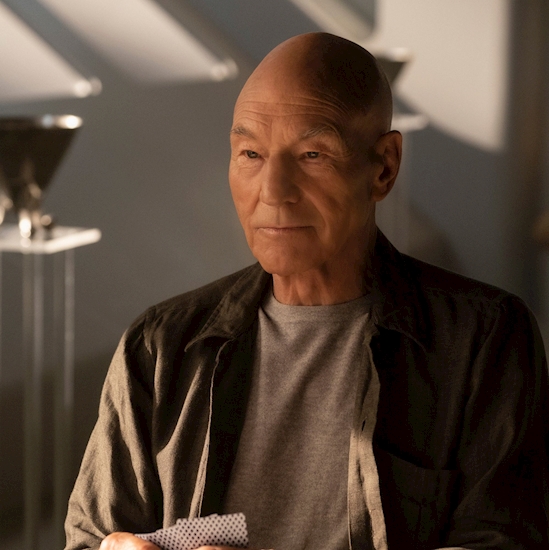Picard isn't the best thing about Star Trek: Picard
Star Trek: Picard spoilers follow.
Starfleet, and therefore Star Trek, is mainly a team effort. Across nine series and countless missions, the franchise has introduced a variety of officers who all play a vital part in maintaining peace and freedom within the Federation borders.
However, the latest Star Trek showhas deviated from this by putting one officer front and centre for the very first time. Never before has a Star Trek series been named after just one character, but to be fair, Jean-Luc Picard isn't just any old officer.
For many Star Trek fans, Patrick Stewart's character in The Next Generation can't be beat. With his "engaging" presence and charming love of Earl Grey, the Enterprise's Captain remains a huge fan favourite, and it's impossible to imagine this franchise still existing without him.
It makes perfect sense than that Picard would become the first Star Trek character to lead his own show. Yes, it's wonderfully nostalgic to see Patrick Stewart reprise the role which made him a star, but by putting Picard centre stage, it also provides the franchise with new opportunities to explore notions of legacy and what it means to be a much older "action hero".
Unfortunately, Picard hasn't always lived up to the challenge it set for itself. While the pilot went out of its way to remind us that this isn't the Jean-Luc of old, homing in primarily on his guilt and trauma, later episodes have mostly sidelined this in favour of the wider Soji storyline.
To be fair, that shouldn't come as much of a surprise. By its very nature, Picard has more to juggle than any other Star Trek show before it.
Not only does this new series need to connect with the past in a meaningful way, it must also continue paving new ground in ways that push the franchise forward, modernising older characters while simultaneously introducing new ones too.
That's a tall order for any show, let alone one which is loaded with so much pressure and all those heightened fan expectations. Unfortunately, Star Trek:Picard doesn't always deliver the goods, at least, when it comes to Picard himself.
Like always, Stewart's performance in the lead cannot be faulted, but his character doesn't quite resonate in the same way he once did. Part of this might be down to frustration on our part. It makes sense that the former Starfleet Captain would cling to his former glories, but Jean-Luc's righteousness in every situation seems less feasible now given the trauma he's suffering in the wake of Data's demise.
Following Picard's premiere, Syfy argued that the show wrongly portrays Jean-Luc still as the infallible hero of yesteryear. As they rightly suggest: "Fans would be better served to remember that — for all we love him — Picard is a man with blind spots and flaws."
Loyalty to the ideal of Picard has, ironically enough, failed to do his character justice here. Instead, it's those around him who now have far more intriguing stories to tell.
Although it's obvious why Stewart's hero would take centre stage here, Star Trek: Picard might have actually been better off sticking with its tried and trusted formula in this regard, pushing the ship's actual Captain to the fore instead.
When we first meet Captain Rios in the pilot, Santiago Cabrera's character seems pretty generic. How many times have we seen the sad, alcoholic loner with a heart of gold risk it all one last time?
As the series progresses, Rios himself doesn't develop much further in that regard, but there are still more layers to him than you'd think, and they manifest themselves in the most literal way possible.
Before Picard assembled the crew, Rios used a group of holograms to perform all of the major functions needed on his ship, and funnily enough, each of them physically resembles him as well.
It's not all about the looks though. The holograms all vary wildly in terms of both their accents and their general dispositions too. From the mild-mannered medic to the Scottish engineer hologram, Cabrera plays each and every one of them differently, bringing some major Orphan Black vibes to the Star Trek universe.
On a deeper level, each of these holograms also embodies different facets of Rios's personality, belying a complexity not immediately apparent on the surface.
Cabrera expanded on this further during a recent interview with Syfy, explaining that:
"The whole thing with the holos was, it couldn't just be for the sake of it. There had to be substance to it. What hooked me and what I loved about it was the psychology behind a man who is alone and happens to be with these versions of himself. It's better when you can reveal something about a character without saying too much."
Cabrera worked with the Picard producers to ensure that each hologram/persona would be sufficiently different from each other, and in doing so, they created the highlight of this series.
Jean-Luc will always be a fascinating character, and he rightly deserves another chance in the spotlight. Moving forward though, Picard will need to develop our hero further or run the risk of being overshadowed by Cabrera's multiple roles.
Star Trek has always been a team effort, but Rios is a team unto himself, and Jean-Luc will need to fight harder than ever to keep up with his star power.
Star Trek: Picard airs on CBS All Access in the US and Amazon Prime internationally, including the UK.
Digital Spy now has a newsletter – sign up to get it sent straight to your inbox.
Want up-to-the-minute entertainment news and features? Just hit 'Like' on our Digital Spy Facebook page and 'Follow' on our @digitalspy Instagram and Twitter accounts.
Source: www.digitalspy.com

